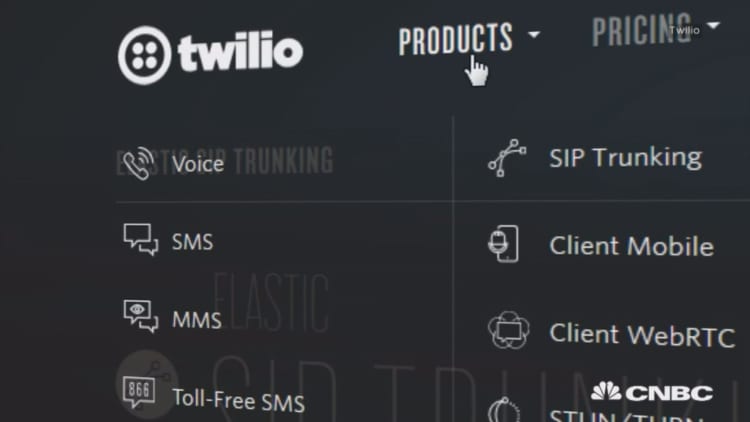
All eyes are on Twilio this week to see how the market reacts to the first U.S. venture-backed tech IPO of 2016.
Not since Square's debut in November has a domestic technology company fueled by venture capitalists tested the public markets. Cloud software developer Twilio is scheduled to sell shares on Wednesday night and start trading the following day on the New York Stock Exchange.
The drought is being felt across the start-up landscape because emerging software and internet companies count on IPOs to produce returns that investors can plunge back into the ecosystem. From 2001 to 2015, an average of 37 tech companies went public each year, according to data from Jay Ritter, a finance professor at the University of Florida and an IPO expert.
"Everybody in the VC world will be paying attention," said Mamoon Hamid, a partner at venture firm Social Capital in Palo Alto, California. "It's a billion-dollar software company, and it has implications on the broader tech IPO landscape."
Twilio said in its updated IPO prospectus last week that it plans to sell 11.5 million shares at a preliminary range of $12 to $14, placing its market capitalization as high as $1.15 billion. The company's last private investors paid $11.31 a share in 2015.
San Francisco-based Twilio has grown rapidly — 88 percent last year — by selling software that helps companies communicate with their customers using voice, video and messaging in anonymized fashion. For example, OpenTable uses Twilio to send reservation notifications, while the technology lets Nordstrom salespeople chat with customers who are waiting for a specific product to arrive.
Uber is also a big client. The ride-hailing company facilitates one-on-one conversations between drivers and riders without divulging personal phone numbers. Airbnb does the same for hosts and guests.
There's a big backlog of companies paying close attention to how Twilio performs. According to The Wall Street Journal's list of billion-dollar start-ups, 37 software companies are valued in at least the 10 figures, including Dropbox, Nutanix, Cloudera and Okta.
InsideSales.com is also in the club, with a valuation of $1.5 billion. CEO Dave Elkington said everyone is waiting on the sidelines amid a flood of uncertainty in the market. In addition to general bearishness when it comes to unprofitable software companies, investors are following an unpredictable presidential election and the looming threat of a Brexit.
"It's been a freakin' winter all spring," said Elkington, whose company develops software for sales teams. "Most CEOs are waiting to see how the Twilio IPO turns out. Is it going to pop? Will it come down 30 to 60 days later?"
Longer-term performance is important for insiders because executives and early investors can't begin to cash out for at least six months following the IPO. Companies including Box, Hortonworks and LendingClub are trading well below their offer prices, leaving late-stage investors under water.
The first big VC-backed tech IPO of 2016 should be an "exciting thing" for investors and for other tech companies similar to InsideSales, Elkington said, but he doesn't expect anyone to react immediately.
"One IPO isn't enough," he said.
It's a much rosier story for those that are going to generate cash.Todd McKinnonOkta CEO
Okta CEO Todd McKinnon said he'll also be watching closely, mostly to see the kind of revenue multiples Wall Street is willing to give a newly public cloud software company. At $1.15 billion, Twilio would be valued at just under five times sales, assuming its first quarter revenue of $59.3 million was annualized.
Though McKinnon wouldn't say how close Okta, a provider of identity management software, is to an IPO, investors are telling him that software companies need to be able to produce cash within two quarters of their debut.
"It's a much rosier story for those that are going to generate cash," he said.
Twilio is taking a big risk in trying to be the first software company to go public after an extended lull.
"There's a fleet of companies now thinking it's time to go public, but nobody wants to go first," said Lise Buyer, a partner at IPO advisory firm Class V Group. "Investment bankers will take you out, but only after someone else tests the markets, so hats off to Twilio."
Buyer, who worked on Google's IPO in 2004, said she's talked to a number of institutional investors recently who are interested in adding new businesses to their portfolios, and there seems to be a "hunger in the marketplace" for emerging companies that are priced appropriately.
Still, with the July 4 holidays quickly approaching and the Republican National Convention just around the corner, she doesn't expect there to be a rush.
Venture capitalist Marc Andreessen told an audience at the Bloomberg Technology Conference last week that he sees plenty more IPOs n 2017 and 2018 than in the past few years. To gear up, his firm Andreessen Horowitz has created an internal group to help portfolio companies prepare for an IPO.
"There are a bunch of companies that are legitimately getting ready to go [public] and will go," he said.
Cloud storage and computing vendor Nutanix filed to go public in December but has been holding off due to increased market volatility. A Nutanix spokesman declined to comment on the significance of Twilio's IPO or on the company's progress in moving forward with an offering.
As Twilio prepares to hit the markets this week, it's yet to make a profit. In 2015, revenue almost doubled to $166.9 million, with a net loss of $35.5 million.
Further, Twilio relies heavily on WhatsApp, the messaging app owned by Facebook. Last year, WhatsApp accounted for 17 percent of Twilio's revenue, up from 13 percent in 2014 and 11 percent in 2013, the IPO prospectus said.
Twilio said that dependence should come down over time, but "WhatsApp may continue to account for a significant portion of our revenue, at least in the near term."
Twilio, which will trade under the ticker symbol TWLO, said proceeds from the IPO will be used for investing in engineering and marketing, and for expanding its technology platform. Brad Gerstner of Altimeter Capital, a Twilio investor, told CNBC last week that it's a "multiyear story."
"This is the Intel on the inside for all communications [apps and platforms] from WhatsApp to Uber," he said. And he has a reminder for all those who focus on IPOs: "Don't pay attention to the noise associated with the first day of trading."





